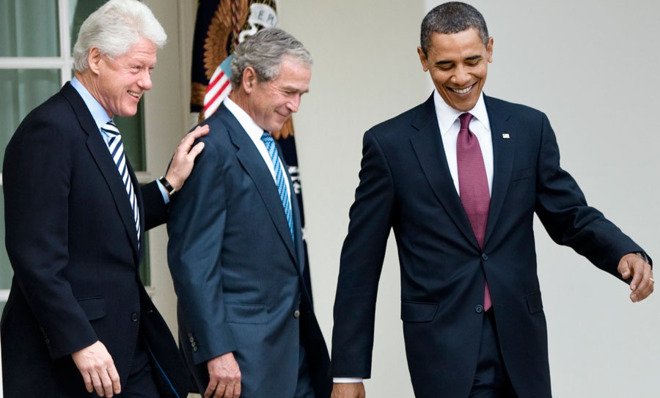How you judge politicians' attractiveness, according to science
Research shows that Democrats think their political heroes are hotter than Republican leaders, and vice versa

A free daily email with the biggest news stories of the day – and the best features from TheWeek.com
You are now subscribed
Your newsletter sign-up was successful

Beauty, they say, is in the eyes of the beholdee's in-group.
At least, that's what they say if "they" means researchers interested in how we perceive political leaders. According to researchers at Cornell University's Lab for Experimental Economics and Decision Research, people seem to be judging the cover in part by the content of the book: Democrats find their political heroes more attractive than Republican leaders, and vice versa.
Curious to know, essentially, how hot for their leaders partisans and average citizens were, the lab's co-director, Kevin Kniffin, and colleagues conducted a simple test — they asked people to say how attractive sets of familiar and unfamiliar political figures were. In theory, if a person's beauty or handsomeness were a fixed, objective trait of an individual — something we all agreed on — a beholder's partisan leanings ought to have no impact.
The Week
Escape your echo chamber. Get the facts behind the news, plus analysis from multiple perspectives.

Sign up for The Week's Free Newsletters
From our morning news briefing to a weekly Good News Newsletter, get the best of The Week delivered directly to your inbox.
From our morning news briefing to a weekly Good News Newsletter, get the best of The Week delivered directly to your inbox.
But that is not what Kniffin and company found. In one version of the experiment, the researchers asked a total of 49 aides working for Wisconsin state legislators — 38 Democrats and 11 Republicans, owing to the balance of power in the state — to rate the attractiveness of 24 politicians. That total included 16 familiar leaders, including recent Wisconsin gubernatorial and United States senate candidates, and eight relatively unfamiliar ones who came from New York.
The aides rated familiar politicians as more attractive than unfamiliar ones overall, but, more importantly, they thought leaders of their own party were more appealing than others. Democratic aides, for example, rated their leaders on average about a 5.5 on a nine-point scale and rated Republican leaders about 4.5. For Republican aides, those ratings were 4.2 and 5.2, respectively. Those results depended on aides being familiar with those politicians, though. When they were ogling low-profile politicians from New York, Wisconsin legislative aides found them a point or two less attractive overall, and Democrats rated Republican and Democratic leaders as equally attractive. Republican aides rated GOP leaders as more attractive than their donkey counterparts, but only by less than half a point. These results suggest that the aides had to actually know something about who they were rating for there to be a partisanship-attractiveness effect.
Those findings are at odds with studies that presume physical attractiveness is a "static personal characteristic that influences how people perceive each other," the authors write in the Leadership Quarterly. "In effect, we find evidence that people are capable — for better or worse — of judging covers by their books, whereby the cover of physical attractiveness is viewed partly and significantly through the lens of organizational membership."
Pacific Standard grapples with the nation's biggest issues by illuminating why we do what we do. For more on the science of society, sign up for its weekly email update or subscribe to its bimonthly print magazine.
A free daily email with the biggest news stories of the day – and the best features from TheWeek.com
More from Pacific Standard...